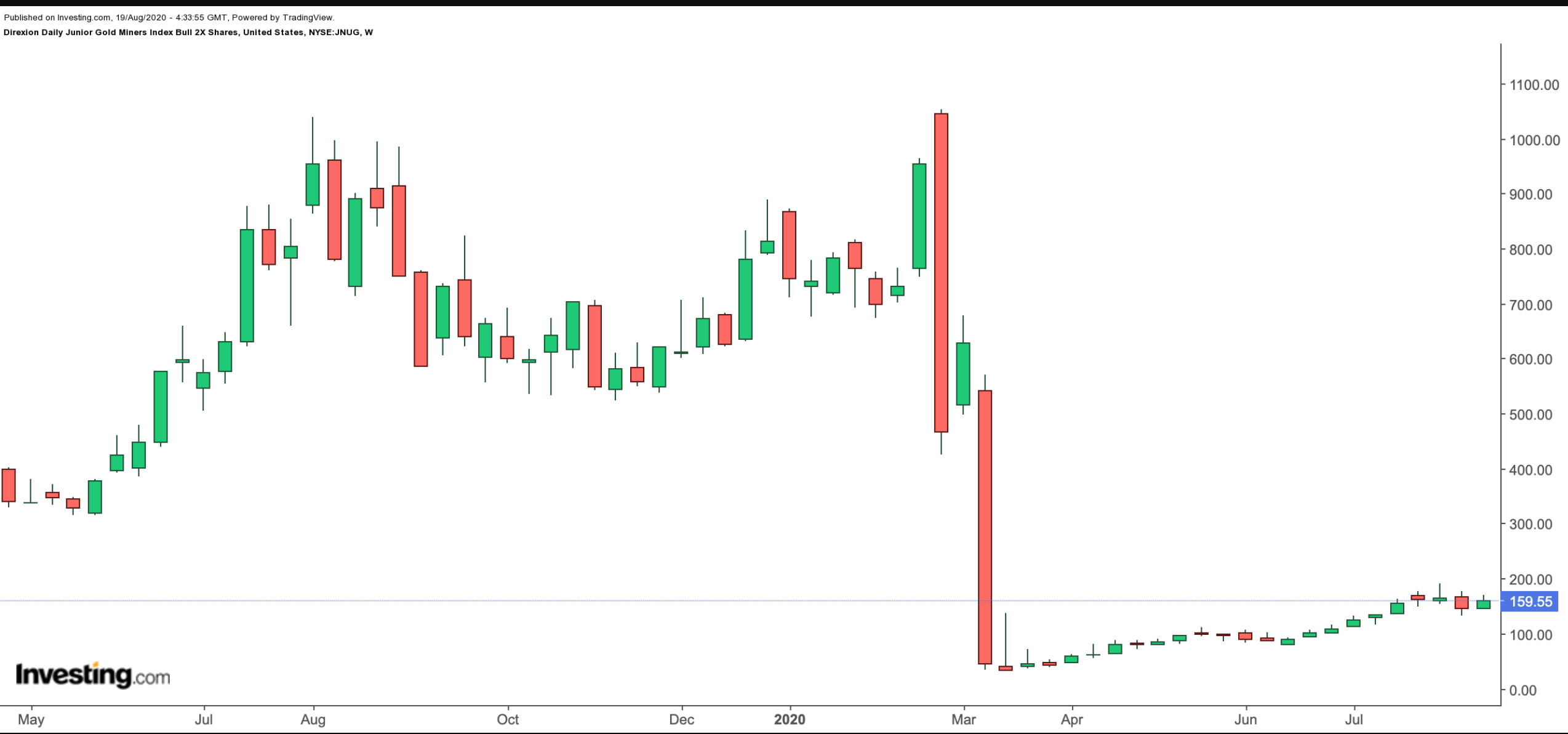Leveraged ETFs offer the potential for amplified gains, albeit at an increased risk.
Still, for short-term investors, leveraged ETFs (LETF) can be appealing. The Direxion Daily S&P Oil & Gas Exp. & Prod. Bull 2X Shares (NYSE:GUSH), for example, has demonstrated popularity among Robinhood traders, making it onto the list of the 100 most popular stocks on the online trading platform.
GUSH is a "2x" LETF, which typically uses derivative instruments to amplify the returns of an underlying index.
LETFs are available on many ETFs that track indices, such as the Dow Jones Industrial Average, NASDAQ 100 and S&P 500 indices, as well as commodities, like oil and gold.
While a traditional exchange-traded fund usually tracks the securities in its underlying index on a one-to-one basis, a leveraged ETF may target a two-to-one (2X) or three-to-one (3X) ratio.
Below we'll break down important characteristics to understand about leveraged ETFs before investing:
Funds For Bulls And Bears
Usually marketed as bull or bear, leveraged ETFs provide investors the opportunity to inverse or short funds. For example, the ProShares Ultra QQQ ETF (NYSE:QLD) seeks daily investment results that correspond to two times (2x) the daily performance of the NASDAQ 100 index.
On the other hand, the ProShares UltraPro Short QQQ (NASDAQ:SQQQ) seeks daily investment results that correspond to three times the inverse (-3x) of the daily performance of the NASDAQ 100 index. Thus, a trader who goes long an inverse LETF is in effect shorting the underlying index without initiating a short-selling transaction, which would likely have stricter margin requirements.
On a daily, basis, QLD and SQQQ attempt to achieve returns that are “2x” or “-3x” the daily index return respectively, meaning that it will “double the gain” or “triple the loss” of the market on a given day.
The Key Word Being 'Daily'
One of the most important characteristics of LETFs is the daily re-balancing. Let’s look at the example of the Direxion Daily Junior Gold Miners Index Bull 2X Shares (NYSE:JNUG).
JNUG tracks the MVIS Global Junior Gold Miners Index (MVGDXJ) and seeks 200% or -200%—2X the return of this benchmark index for a single day. This daily leverage gives JNUG certain characteristics that likely make it an inappropriate long-term holding. This is why short-term traders use these LTEFs for directional bets during the trading day.
In 2020, gold has made a powerful run higher, up about 30% year-to-date (YTD).
There is a wide range of ETFs to track the price of the yellow metal, including SPDR Gold Shares (NYSE:GLD) and SPDR Gold MiniShares (NYSE:GLDM)—both of which have climbed about 31% for the year.
There are also funds that invest in miners, such as the VanEck Vectors Gold Miners ETF (NYSE:GDX) and the VanEck Vectors Junior Gold Miners ETF (NYSE:GDXJ), which have soared about 45% and 43% respectively in 2020. MVGDXJ, the index that JNUG tracks, is also up about 43% in 2020.
However, JNUG itself has plunged over 80% YTD. Another popular commodity leveraged ETF, Direxion Daily Gold Miners Bull 2X ETF (NYSE:NUGT), has also dropped over 41% so far this year.
The key reason for the discrepancy between the LETFs and the ETFs they track: leverage.

A 2X LETF like JNUG stock is structured to be constantly 2X leveraged on a daily basis. This 2X long LTEF needs to buy every day when underlying asset prices go up, and sell when they go down. However, the compounding effects of daily returns work against long-term investors.
Bottom Line
LETFs can be valuable investment tools. However, it is crucial for market participants to appreciate that those who hold LETFs for periods longer than a day expose themselves to substantial risk.
In the coming weeks we'll take a closer look at specific leveraged ETFs.
